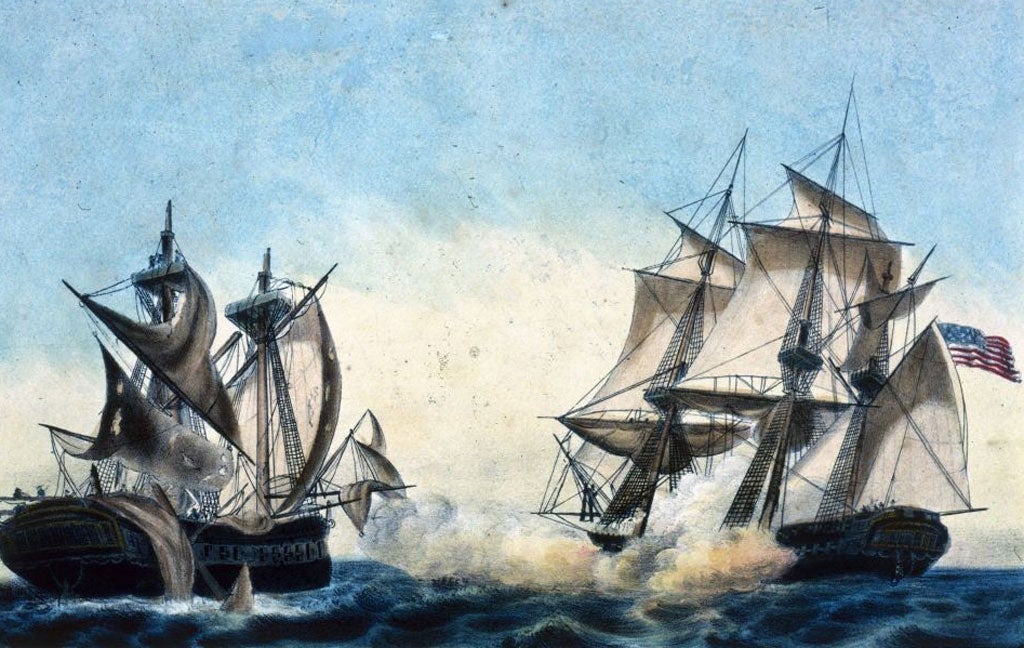The Challenge: Britain Against America in the Naval War of 1812, By Andrew Lambert
Skullduggery at sea as rebels flout Britannia on the waves

Your support helps us to tell the story
From reproductive rights to climate change to Big Tech, The Independent is on the ground when the story is developing. Whether it's investigating the financials of Elon Musk's pro-Trump PAC or producing our latest documentary, 'The A Word', which shines a light on the American women fighting for reproductive rights, we know how important it is to parse out the facts from the messaging.
At such a critical moment in US history, we need reporters on the ground. Your donation allows us to keep sending journalists to speak to both sides of the story.
The Independent is trusted by Americans across the entire political spectrum. And unlike many other quality news outlets, we choose not to lock Americans out of our reporting and analysis with paywalls. We believe quality journalism should be available to everyone, paid for by those who can afford it.
Your support makes all the difference.This is not the cool academic reappraisal of the Anglo-American War of 1812-14 one might expect from a Professor of Naval History. Andrew Lambert inveighs against the "unimaginable folly" of President James Madison's administration for picking a fight with a global power from a position of abject weakness. As a result the fledgling United States suffered a series of military defeats along the Canadian border, lost much of its minuscule navy including the flagship, saw its revenue shrink to the point of national bankruptcy and had its capital occupied by a few thousand British troops. They burned the public buildings, including the presidential mansion: subsequently rebuilt as the White House. Before torching it, as Admiral Cochrane's ADC ironically recorded, they quaffed the "super-excellent Madeira" placed on ice for the President and his generals, and devoured the banquet prepared for those "resolute champions of republican freedom".
Lambert is tendentious about the causes of the war, which he traces back to the "mind and measures" of Thomas Jefferson. The squire of Monticello was almost as hostile to New England, with its squalid commercial concerns, as to England, whose monarchical system and maritime domination challenged the regime of agrarian simplicity and Roman virtue that he espoused. Drawing his politics from Rousseau, Jefferson evinced, according to Lambert, a clear "trend towards totalitarianism". So he did nothing to avert Madison's belligerent response to the Royal Navy's interference with neutral shipping and impressment of American seamen – half of whom were actually British.
Lambert plays down the significance of early American naval victories. It was understandable that new US 44-gun frigates should prove superior to their smaller, more lightly armed British equivalents. But single-ship actions made no appreciable difference in what was, after all, a skirmish compared to the titanic struggle against Napoleon. Lambert applies double standards: when the USS Essex challenged HMS Phoebe to single combat, he disdains it as "petty tomfoolery"; but when Captain Philip Broke proposed a duel between his vessel, HMS Shannon, and Captain James Lawrence's USS Chesapeake, it was "a masterpiece of psychological warfare".
Broke is the hero of Lambert's story, "the most single-minded perfectionist ever to command a ship in battle". Anyone who has thrilled to the exploits of Hornblower or Aubrey will revel in Lambert's vivid and well-informed description of the epic engagement off Boston in which he overwhelmed his adversary. It lasted a mere 11 minutes, during which the American frigate was raked by murderous broadsides. Broke wore full uniform so that he could be recognised and a stout leather top hat to protect himself from falling spars. But after boarding the Chesapeake he lost his hat and was slashed by a cutlass, which split his skull. Amazingly he survived.
Broke owed his triumph to well-drilled gunnery. What Lambert does not satisfactorily explain is why this tactic paid off so handsomely when earlier American successes had been won by firing chain shot and other dismantling projectiles into the rigging of enemy vessels, which made them sitting ducks. Nor does he acknowledge that sheer bad played a key part in Lawrence's downfall.
Although The Challenge is an accomplished work, full of high drama, trenchant argument and solid scholarship, it is seriously flawed. The writing is often patchy and sometimes trite.
Above all, it is unduly dismissive of the US. Americans did not embark on the conflict out of stupidity but because they felt threatened by Britain and thought they could win. Napoleon looked set to vanquish Russia. Wellington's army depended on American grain. Canada fed the West Indies and supplied the Royal Navy with masts, yet the Kentucky militia alone seemed more than a match for British forces.
US warships exploded the myth of Britannia's naval invincibility. In the prescient words of Admiral Sir John Warren, Americans "entertained the idea at some future time of assuming the Empire of the Sea".
Piers Brendon's 'The Decline and Fall of the British Empire' is published by Vintage
Join our commenting forum
Join thought-provoking conversations, follow other Independent readers and see their replies
Comments